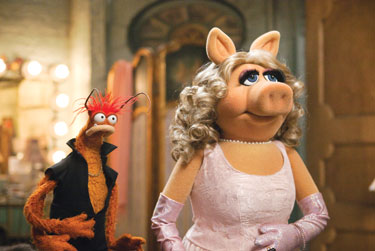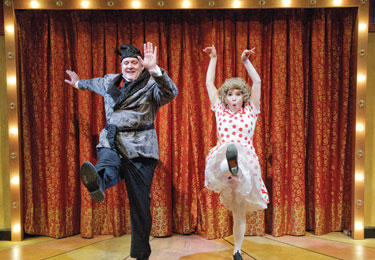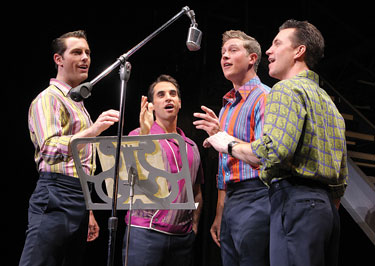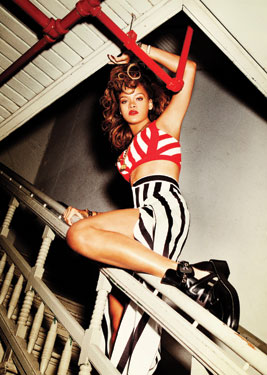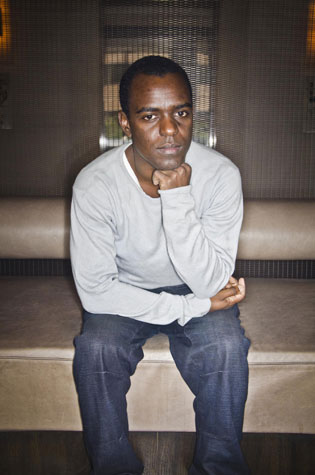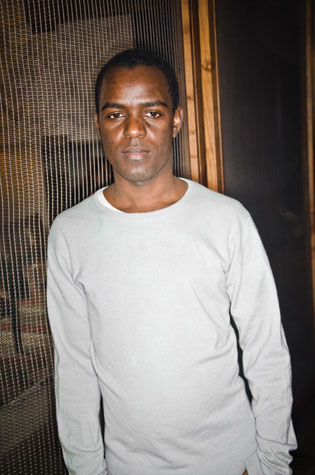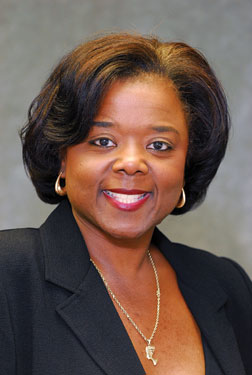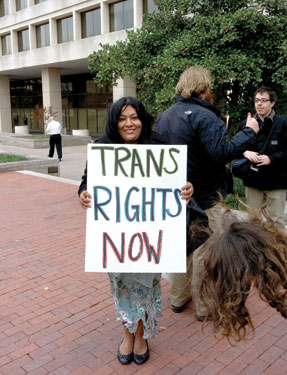Feature Story:
For a month, Frank Mugisha is out of Uganda. In late October, he arrived in Norway, where he received the Rafto Prize on behalf of the organization he leads, Sexual Minorities Uganda (SMUG). Earlier this month, he accepted the Robert F. Kennedy Human Rights Award from the D.C.-based RFK Center for Justice and Human Rights, which includes ongoing assistance from the center and $30,000 for Mugisha to use at his discretion. Then there are the countless media demands – certainly welcome when you're promoting a cause.
In Mugisha's case, the cause is equality for LGBT people in Uganda. And as the head of its primary LGBT organization, when he's not out of Uganda, he's out in Uganda. The slight 29-year-old stands in a harsh spotlight, unblinking.
![Frank Mugisha]()
Frank Mugisha
(Photo by Julian Vankim)
''Someone will come out to one person, who then hates them, and then they don't want to leave their house because they are scared everyone is going to hate them,'' Mugisha says of the situation for gay people back home. ''They call you, they want to commit suicide. I tell them, 'You know what? I came out to my brother and he hated me. But after a year, two years, he loves me. I came out to some friends. Three of them love me, and seven don't.' That kind of courage and hope – the sharing – is healing for me from my own discrimination. It helps me. It gives me a lot of courage.''
And he needs it. Take the grim reminder during Mugisha's trip abroad: Nov. 10, the day he received the RFK Center honor, a court in Uganda sentenced Sidney Nsubuga Enoch to 30 years in prison. Enoch had confessed to murdering David Kato, beating him to death with a hammer, according to Uganda's Daily Monitor newspaper. Cato had been Mugisha's friend and colleague at SMUG.
Then, of course, there is the Uganda Anti-Homosexuality Bill – aka the ''Kill the Gays bill'' in that it calls for the execution in cases of ''aggravated homosexuality'' – introduced by Member of Parliament David Bahati in 2009.
Mugisha says the introduction of the bill, seemingly influenced by anti-gay American evangelicals visiting Uganda and touting so called ''ex-gay'' therapies, made a bad situation worse.
''It hasn't been as bad as it is now,'' says Mugisha. ''The bill came in 2009. I was harassed and went in exile to Nairobi [Kenya] with my colleagues. That was 2008. In 2007, I had to move from my house because I was being harassed. That was before the bill. The problem was mainly for us activists, not for the ordinary gay person. Now they are being harassed as well – even more than we are harassed.''
Two years on, the bill refuses to go away.
As Moses Mworeko, a gay Ugandan granted asylum in the United States and living in D.C., points out, ''The people who initiated it in the first place are still there, still in that government. It's been held up by a few people, but it's still there.''
''I think Frank has some immunity,'' adds Mworeko as he praises Mugisha's work in bringing Uganda's small LGBT groups together under the SMUG umbrella. ''Most people know him, so there is no way the government can arrest him. But he has to be very careful. He has to watch his back all the time.''
Alison Peters, studying international affairs at George Washington University, also knows Mugisha, having met him a year ago while working as an intern in the Ugandan Parliament. And she also worries about his return home at the end of the month.
''I'm a bit nervous now that there's a higher profile,'' she says in light of the recent awards, and countering Mworeko's assessment. ''It's definitely a bit disconcerting. And I'm not really sure how to help. If I was to go over there, that would just backfire. What's the next step? A letter-writing campaign? It's a fundamental uphill battle.''
That battle, however, has traction, even here. For example, Peters helped organize an event for Mugisha at GW. All 300 seats sold out – including 25 seats to a campus fraternity whose pledge master mandated his pledges attend after hearing one use anti-gay language, Peters shares.
That's a small victory, but a victory just the same. And Mugisha is confident he can win many more back at home.
METRO WEEKLY: Tell me what a typical day in like for you in Uganda.
FRANK MUGISHA: I have a work plan. I have projects. I have campaigns, advocacy work, capacity development for all the organizations, because my organization is a network. And we do emergency response. Under emergency response, I have a whole security team, six people.
Maybe I have a campaign on HIV/AIDS work. Maybe I have a media campaign. Maybe I have a campaign to lobby the police or teach the police. Different campaigns. It could be a ''no hate'' campaign. And I have capacity development. Under capacity development, there are many different programs I'm running at this moment – for leadership, management, entrepreneurship – many different programs I'm running. Then we have litigation and legal support. We work with lawyers who can work with LGBT people who are being arrested.
That is ''on the book.'' That's what I'm supposed to do.
But when I wake up in the morning, I have emergency response and crisis response. I try to respond to anything that has happened. If someone calls me and they need counseling, I have to give them references. That is not in the program, but I have to take their call if they've not called the hotline, if they've called my number because they just found it from the Internet or somewhere. I'll pick it up and I'll respond to that. If someone is arrested, something I see in the media – I pick up a paper or I'm watching television and see it – I have to go where they are, even if it is 200 miles from where I live. I have to get there, get to the prison, interview them, ask them what happened, how they were arrested. And, if need be, find them a lawyer and get them out of jail. If someone is beaten up, they just call my phone. Some have memorized it. They just call and say, ''I'm at this location. I was beaten by homophobic people. I need help.'' So I just run there, take them to the hospital, rescue them.
Every day I go to work, there are different activities I have to do. It depends on what I'm doing in a month, in a week, in a quarter.
MW: And your phone is always ringing?
MUGISHA: Yes. Every second. And text messages. I don't say I work from 6 to 8. I work 24 hours. Anytime my phone rings, I respond.
MW: Is the work tiring?
MUGISHA: Of course it is. I just do it.
MW: Do you get enough support?
MUGISHA: What kind of support?
MW: From other activists, other organizations?
MUGISHA: Yes. I have a staff of about six people and very many volunteers. People come mostly for the campaigns.
We don't have enough resources in terms of funding to pay people who can be on standby every minute in case people need help. I started as a volunteer in SMUG. Not until July of this year am I being paid. We got a grant so I can be paid.
But it is very difficult. If someone calls me and they're in prison, I could call a colleague and say, ''Come with me,'' and they'll come with me. It's risky. People get scared. They say, ''You're taking me to prison to get someone – what if I get arrested myself?'' I can't rely so much on people, because they can put down my energy. If I call them and they tell me, ''We can't go. It's scary.'' Then I could get scared also. So I just, some days, just do it on my own. The person I used to work most with was David, who was murdered, because he would respond to a call anytime.
MW: How closely did you work with David Kato?
MUGISHA: I met him in 2006 and from that time we started working together and never stopped. We taught each other a lot.
MW: What do you think of the sentencing?
MUGISHA: I don't believe in the whole process, the trial. It was very quick. I don't believe in the way it happened. We heard he was sentenced, but we don't know what happened. We're confused about the whole process. I'm not satisfied.
MW: Do you think anyone in Uganda will argue the 30-year sentence is too severe?
MUGISHA: Severe? When someone has murdered someone and has confessed to the murder and is only given 30 years? I don't think anyone could say that's severe. Not even ordinary people on the street.
MW: How dangerous is the work you do?
MUGISHA: I don't have an answer. I just do it. Bad things happen. People get hurt. David was killed. But I don't know. I just don't think about that. I don't want to think about that. If I think about it, I won't do it. Though I know it is dangerous, I don't know how dangerous it is.
MW: Do you get threats?
MUGISHA: Yes. I get threatened many times. I get all sorts of threats. My threats are more or less the homophobia I receive every day.
I don't know if people could really understand about being gay and being an activist. It's not a job you sign up for. I did not sign up to be an activist. I just became an activist. It's part of me. I grew up with all the discrimination. I've been facing it, I've lived with it. You deal with it all the time.
MW: I'm puzzled by a difference between Uganda and more conservative countries. Iran or Saudi Arabia, for example, are incredibly homophobic countries, but they're also intolerant across the board. In Uganda, on their other hand, there is a lot of alcohol. There are topless women in tabloids. Uganda doesn't seem so socially conservative.
MUGISHA: People know about alcohol. People know about going out and partying and all those things. However conservative Uganda may be, these are open issues. But the issue of homosexuality has been so much related to sex.
If you had people in Uganda kissing on the street, heterosexuals, Ugandans would not take that easily. They would not harass them or bash them, but they would see it as something not normal, whereas in other countries people can kiss on the street and no one would take time to look. Issues that are connected to sex and sexuality, Ugandans don't want them to come out in public. Red Pepper, the tabloid, many times publishes nude pictures, … but it's not Ugandan society doing it. Ugandan people, you cannot find them doing what the tabloid is saying. People have always tried to shut that out.
I remember a time, recently, when Ugandans were very hostile to women wearing short skirts. We had a government official saying we must bring a law against women wearing short skirts.
So it is something to do with sex and sexuality. People just don't want these things talked about, and many times the media portrays homosexuality as sex.
MW: You've pointed to American evangelicals in Uganda to push ''ex-gay'' beliefs, laws against gay people. What have you seen?
MUGISHA: Religion is part of the reason why there is a lot of homophobia in Uganda. Religion has made homosexuals very, very evil. Religion has picked on homosexuality only. The reason? I don't know why.
There are so many things going on. Religious leaders, in many cases, are even part of the corruption, ripping people off every day. They're not condemning corruption, but they are condemning homosexuality.
Part of it has to do with the influence from conservative voices from other countries. Conservative Americans have told our Christians, ''Homosexuality is evil, and it is from our countries. It is not African.'' That has gone into our society, that homosexuality is not African, it is evil, and they should reject it.
![Frank Mugisha]()
Frank Mugisha
MW: ''Importing'' homosexuality is different than importing Christianity?
MUGISHA: It's difficult to explain. Christianity is big. It is very, very, very big in Uganda. Homosexuality is not big in Uganda. You cannot come and say Christianity was brought, and homosexuality also brought. You do not have a space to explain this. You don't have the avenue, whereas Christianity has the avenue. They have the language. Religion has been interpreted in all the languages of Uganda. Everyone understands religion, because there are very many churches.
[The Americans] did have influence. I don't know how much. They came to Uganda the same time the [Bahati] bill came. I don't want to play the blame game. American evangelicals came to Uganda, right. But Ugandans could have said no. ''No, we cannot take your issues. We are good people. We don't want to be homophobic.'' The Ugandans themselves picked up on what the Americans said. And American evangelicals teamed up with the elite – the pastors, the preachers who know that homosexuals had not done anything wrong. But they teamed up with the elite preachers and members of Parliament.
MW: Are there any churches that are affirming or sympathetic?
MUGISHA: No, they are not there. If they are, they are not open about it. We don't know about them. So there is no avenue. There is a church every meter in Uganda, and in that church are people who have never even met an openly gay person.
MW: You were raised Catholic?
MUGISHA: Yes.
MW: Do you still belong to the church?
MUGISHA: I still belong to the Catholic Church. I still love my faith. I'm still a believer in Christianity, but I don't go to church for many reasons. One reason is that I'm very busy. I work a lot. The other reason is that I don't want to listen to what the preachers are going to say. I believe they are just human beings. They have nothing to do with my faith. They are talking, and I don't have the space to talk back if what they are saying is wrong and I have another opinion. If it was a debate every Sunday, I would go. I would talk back and maybe change some people's minds. But it is them talking and I can't talk back. I would rather stay home.
MW: Would there be any point to American LGBT activists coming to Uganda to try to help SMUG's mission?
MUGISHA: They would get killed. I don't think Uganda can allow any public dialogue that is not protected by the police or the army to happen. People would get stoned. What would they do? What do you envision if American activists came?
Like I told you, the church space is big, it's welcome, it's clear. I started understanding the language of ''conservative,'' ''progressive,'' ''right wing,'' ''left wing'' – all of that – after Americans came to Uganda. I had to learn the language as an activist. Before that, I did not know there were ''ex-gay'' people. Who is ex-gay? There is no ex-gay, but now I know that. I did not know about ''recruiting.'' If someone talked about recruiting in my country, it would be recruiting into the army. But now they're saying gay people recruit. There are ex-gay people. There are conservative and progressive churches. There are affirming churches, non-affirming churches.
Those are things I never knew. That is the language I am learning as an activist.
The churches called conservative, churches I'm learning are very homophobic, have been having homophobic sentiments all the time I've grown up. But what they have done in Uganda is build schools, which is a good thing. They support orphans – thousands of orphans – in Uganda. There is a church in Uganda, which used to be called Kampala Pentecostal Church, that as a young person I loved so much, because, A, it had very many young people going there, and, B, it had open space for young people to express themselves with concerts, different kinds of celebrations. It was a place where a young person would want to go to church. They've got the [Watoto Children's Choir], which everyone loves. There are orphans who have no support at all, but they are brought into this church and they come out with a good education. Now it is called Watoto Church. This church is run by one of the most homophobic people in the world. It is run by Gary Skinner, who is very conservative – Canadian, not American – and in 2010 invited Lou Engle from Kansas City [Mo.] to come and preach in Uganda and give more support to the [Bahati] bill.
So this church, if you are going to bring American LGBT people to Uganda, what message are they going to bring? Accept homosexuality? Homosexuality is good? They are going to get killed. [Ugandans] have someone who is giving them religion, giving them health care, giving them education, who is telling them, ''Love your country. Love Africa. Homosexuality is evil.'' And you're coming as an LGBT person and telling them, ''Support homosexuality''?
MW: So you would need an established, LGBT-affirming church to counter that?
MUGISHA: I think that's what we need. And you'll have to take a very, very long time to even start the conversation on homosexuality. The churches here [in the U.S.] who are very affirming should do the same work that the other churches are doing, because they have money and you're going to need support in those areas. Let them do the same work. Let them teach the message of love.
MW: What can one person do, though? Say there is a lesbian in California who reads about you and SMUG and she wants to help. What should she do?
MUGISHA: There are many ways people here can help. First, we want the conversation here to stay here. In Uganda, they say homosexuality is Western, so if you get a [white, American] lesbian here to come to Uganda, that's ''homosexuality being promoted in Uganda by white people.''
The conversation is mainly political, asking your politicians, ''This issue in Uganda, do you know about it? What are you doing about it?''
MW: A couple of years ago, there was a protest in D.C. by LGBT activists and allies in front of the Ugandan Embassy–
MUGISHA: That helps. When there is a demonstration and the picture is brought back to Uganda, you see the relationship, that there are people like you out there who are concerned.
Most of the ambassadors who come from African countries are friends to the government, relatives to the government. You never see someone from the opposition coming to be an ambassador. And when an issue is brought to their attention in such a public demonstration, then they'll say this is an issue to talk about, maybe talk to human rights organizations and see why people are so concerned about homosexuality. A demonstration outside the Ugandan mission in the U.S., it's news in Uganda.
MW: As you travel outside of Uganda, do you consider not returning? Perhaps applying for asylum somewhere?
MUGISHA: It's not a choice for me. I don't see the reason why I would want to live somewhere else. How would I be happy? Like I told you, my activism is not a job I signed up for. I didn't see an ad in the newspaper. If I live somewhere else, my body would be safe, but my mind won't be safe. The movement is not me. It is so big, bigger than me. But I represent very many people – those that talk with me or see me, and those who don't even know me or even hear about me.
MW: When you look at your goals, where are you hoping to take SMUG? Or is it just like you're dealing with a house on fire?
MUGISHA: It's not a house on fire. I don't want Uganda to be portrayed as this place that is burning, where homosexuals are killed. I wouldn't live there. I wouldn't be alive. I can survive there. And I have parts of civil society that are working with me to try to change people's minds. And I can walk into a prison and manage to convince a police officer to let someone go. Or if I have to get a lawyer to help get someone out, that shows that at least the judiciary is independent – we have won cases. I know journalists, two or three, who very much want to write my positive story – but their editors won't accept that – so for me that is positive. And people are contacting me every day, asking, ''Frank, how can we help you?'' I'm seeing progress.
MW: Where do you want that progress to lead?
MUGISHA: I want to get to a place where there are no laws criminalizing same-sex acts in Uganda. I want to get to a place where there is no member of Parliament who thinks he should come up with laws on homosexuality to ''cure'' homosexuals. I want to get to a place where Uganda – this is the hardest part, it's going to take a very long time – where I see Ugandan people accept that homosexuals are normal. I want to see that.
MW: Do you think you will someday?
MUGISHA: In my generation, that chance is close to 10 percent. With laws, I know those things can change. I tell my colleagues, ''You know what? It is a marathon.'' We are going to put our government on the spot. We're going to get all the help we need. We're going to do this and ask the government to decriminalize homosexuality. That could even happen in five or 10 years. I could see it.
MW: What is your message for LGBT Americans? What do you want them to know about Uganda, about you and SMUG?
MUGISHA: I want them to know that there is a lot going on in Uganda. There is a lot of homophobia. There are a lot of hate crimes, violence towards LGBT people. But we are not standing back. We are standing up to this homophobia.
And I don't work alone. I've got great friends that I work with in Uganda. We are doing everything we can to try to change how people perceive us in Uganda. And we need support, moral support. Send us messages of support. The only question people ask me is, ''What are gay people to do here [in the U.S?]'' And I say support us. Talk to your politicians. Sign petitions. Support progressive work or churches in Uganda. Donate money to SMUG or donate to organizations that work with us, like the RFK Center.
It's not only our struggle in Uganda. When American evangelicals came to Uganda, imagine if we had given in. Imagine if the bill had been passed. It was asking for people to be reported in 24 hours. Every person who is known to be gay would be reported, even those who are not public. And they would go to prison, where they would give you two options: Do you want to go to Family Life Network and the churches that are going to change you to become straight, or do you want to get killed? Who would choose to be killed or to stay in prison? People would choose to get ''cured.'' To avoid prison, they would say, ''Oh, we're cured.'' The study would come back here to the U.S. or to Europe and they would say, ''Healing therapy works. In Uganda we've cured hundreds of homosexuals!'' You may not believe it, but many people believe what is written. It can come back here.
MW: With the upcoming American tradition of Thanksgiving, what are you thankful for?
MUGISHA: I'm thankful, first of all, for my own courage, that I'm able to help people. The biggest thing that has happened to me in my life in Uganda is having a family of new people, gay and lesbian people, who are my family. When I'm in my comfort zone in Uganda, I go to work and it's all my friends there. I make my own world, my own fantasy world, and forget about all the homophobic people in Uganda. I'm very thankful for my brave colleagues that I work with every day.
For more information about Sexual Minorities Uganda, visit the group online at smug.4t.com or on Facebook at facebook.com/groups/smug.2004.
...
more
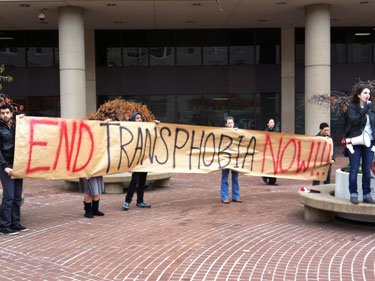
 ...
...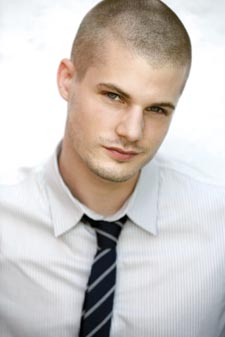
 Zodiac Calendar
Zodiac Calendar
